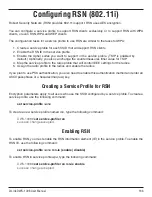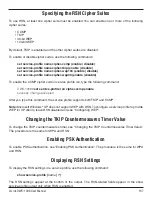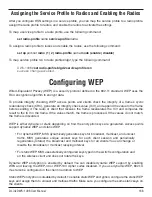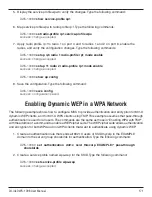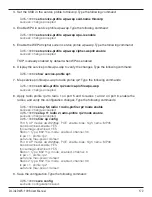
D-Link DWS-1008 User Manual
1
The table below lists the encryption types supported by MSS and their default states.
Encryption Type
Client Support
Default State
Configuration Required in MSS
RSN
RSN clients
Non-RSN clients
Disabled
• Enable the RSN information element (IE).
• Specify the supported cipher suites (CCMP, TKIP, 40-bit
WEP, 104-bit WEP).
TKIP is enabled by default when the RSN IE is enabled.
WPA
WPA clients
Non-WPA clients
Disabled
• Enable the WPA information element (IE).
• Specify the supported cipher suites (CCMP, TKIP, 40-bit
WEP, 104-bit WEP).
TKIP is enabled by default when the WPA IE is enabled.
Dynamic WEP
WEP clients
(WPA and RSNnot
supported)
Enabled
None
Static WEP
WEP clients
(WPA and RSNnot
supported)
Disabled
• Configure the static key(s).
• Assign keys to multicastand unicast traffic.
Configuring WPA
Wi-Fi Protected Access (WPA) is a security enhancement to the IEEE 802.11 wireless standard. WPA
provides enhanced encryption with new cipher suites and provides per-packet message integrity
checks. WPA is based on the 802.11i standard. You can use WPA with 802.1X authentication. If the
client does not support 802.1X, you can use a preshared key on the access point and the client for
authentication.
WPA Cipher Suites
WPA supports the following cipher suites for packet encryption, listed from most secure to least
secure:
• Counter Mode with Cipher Block Chaining Message Authentication Code Protocol
(CCMP)—CCMP provides Advanced Encryption Standard (AES) data encryption. To
provide message integrity, CCMP uses the Cipher Block Chaining Message Authentication
Code (CBC-MAC).
• Temporal Key Integrity Protocol (TKIP)—TKIP uses the RC4 encryption algorithm, a 128-
bit encryption key, a 48-bit initialization vector (IV), and a message integrity code (MIC)
called Michael.
• Wired Equivalent Privacy (WEP) with 104-bit keys—104-bit WEP uses the RC4 encryption
algorithm with a 104-bit key.
• WEP with 40-bit keys—40-bit WEP uses the RC4 encryption algorithm with a 40-bit key.
You can configure access points to support one or more of these cipher suites. For all of these cipher
suites, MSS dynamically generates unique session keys for each session. MSS periodically changes
the keys to reduce the likelihood that a network intruder can intercept enough frames to decode a key.
Summary of Contents for DWS-1008
Page 1: ......
























